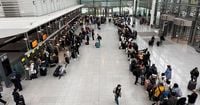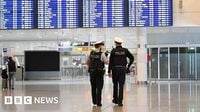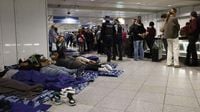Munich International Airport, one of Germany’s busiest travel hubs, found itself at the center of a growing European security concern this past week, as mysterious drone sightings repeatedly shut down flight operations and stranded thousands of travelers. The disruptions, which began late Thursday, October 2, 2025, and continued through Saturday morning, have triggered renewed calls for tougher anti-drone measures and stoked fresh debate over who might be behind the incursions.
The first sign of trouble came late Thursday night, when air traffic controllers at Munich airport suspended operations after multiple drones were spotted in the vicinity. The immediate fallout was significant: 17 flights were canceled and nearly 3,000 passengers were left in limbo, spending the night on camp beds provided by airport authorities, along with blankets and food to help them through the ordeal (according to Reuters and NBC News).
Flights resumed briefly on Friday morning, but the reprieve was short-lived. By Friday evening, more drone sightings forced both runways to close once again, grounding or rerouting dozens of flights and stranding an additional 6,500 passengers overnight. The airport distributed camp beds for a second night running, and the scene was described as one of confusion and frustration, with travelers left to navigate the chaos as best they could (BBC News, CNN, NBC News).
The closure had a ripple effect far beyond the airport’s terminals. As Munich was hosting its world-famous Oktoberfest, millions of visitors from Germany and abroad were pouring into the city. The timing couldn’t have been worse, with the festival’s grand finale set for Sunday and the airport’s disruption threatening to upend travel plans for countless attendees (CNN).
Flights gradually resumed on Saturday morning around 7 a.m. local time, but delays persisted throughout the day. Passengers were repeatedly urged to check their flight status before heading to the airport, as normal operations struggled to recover (BBC News, CNN). In total, the latest shutdown led to at least 23 diverted flights, 58 cancellations, and widespread delays (CNN).
Munich’s ordeal is just the latest chapter in a disturbing trend sweeping across Europe. In recent weeks, unexplained drone sightings have disrupted operations at multiple civilian and military airports in Denmark, Norway, and now Germany. On October 3, Belgian defense officials reported that an unspecified number of drones flew over the Elsenborn military base near the German border, then crossed into Germany, where they were observed by police in the town of Düren (BBC News, CNN).
These incidents have left authorities scrambling for answers. As of Saturday, officials still had no concrete information about who was responsible for the drone overflights at Munich or elsewhere. The drones, which reportedly flew away before they could be identified, have raised alarms about potential security risks to critical infrastructure across the European Union (NBC News, CNN).
The spate of drone incursions has reignited suspicions of Russian involvement, especially in the context of ongoing tensions between Moscow and the West. European authorities have voiced concerns that Russia may be using drones as a tool of hybrid warfare—applying military pressure without crossing the threshold into open conflict. German Chancellor Friedrich Merz said ahead of a recent summit that airspace incursions were getting worse, and that it was “reasonable to assume the drones are coming from Russia” (BBC News). However, Danish authorities have noted that there is no direct evidence linking Moscow to the events, and some experts caution that the technology is widely available, making attribution difficult (CNN, NBC News).
Russian President Vladimir Putin, for his part, has openly mocked the allegations. Speaking at the Valdai Discussion Club in Sochi on October 2, he laughed off questions about drone sightings in Denmark, France, and Copenhagen. “I won’t do it anymore,” he quipped, according to the Kyiv Independent and BBC News. The remark, delivered with characteristic sarcasm, did little to reassure European officials or the traveling public.
In Germany, the political response has been swift and pointed. Bavarian premier Markus Soeder took to social media to demand new emergency legislation granting police the authority to shoot down unauthorized drones over German airspace. “Our police must get the power to shoot drones down,” Soeder wrote on X (formerly Twitter), adding, “We need sovereignty over our airspace.” (Reuters)
Germany’s Interior Minister Alexander Dobrindt echoed these concerns, promising to bring forward proposed legislation that would make it easier for police to request military assistance in neutralizing rogue drones. Dobrindt said he would raise the issue of anti-drone defenses at a meeting of European interior ministers, originally scheduled as a migration summit but now set to include urgent security discussions (BBC News, NBC News). “We are in a race between drone threat and drone defense. We want to and must win this race,” Dobrindt declared in Saarbrücken, where he appeared alongside Chancellor Merz and French President Emmanuel Macron at a ceremony marking the 35th anniversary of Germany’s reunification (NBC News).
At the European level, the crisis has prompted a flurry of diplomatic activity. A leaders’ summit in Copenhagen earlier this week focused on strategies to counter the growing drone threat, with several EU member states backing a multi-layered “drone wall” initiative. The plan, still in its early stages, envisions a network of detection and interception systems to quickly identify and neutralize unauthorized drones—a digital shield rather than a physical barrier (BBC News, CNN).
Denmark, for its part, has already banned all civil drone flights in its airspace as a precaution ahead of the summit, and Prime Minister Mette Frederiksen has publicly identified Russia as the primary security threat to Europe, even as she emphasized the lack of definitive proof regarding the recent drone incidents (CNN).
As the investigation continues, the Munich airport episode serves as a stark reminder of the vulnerabilities that modern technology can expose in even the most carefully managed environments. For the thousands of passengers forced to sleep on camp beds and the millions watching from afar, the story is a cautionary tale about the intersection of security, technology, and the realities of a rapidly changing world. While flights have resumed and Oktoberfest has gone on, the search for answers—and solutions—continues.






